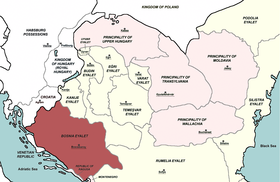Pashaluk of Bosnia
| Bosnia Eyalet Eyalet-i Bosna |
|||||
| Eyalet of the Ottoman Empire | |||||
|
|||||
| Bosnia Eyalet in 1683 | |||||
| Capital |
Bosna-Saray (now Sarajevo) (1520–1553) Banja Luka (1553–1639) Bosna-Saray (now Sarajevo) (1639–1699) Travnik (1699–1832) |
||||
| History | |||||
| • | Established | 1580 | |||
| • | Disestablished | 1867 | |||
| Area | |||||
| • | 1856 | 70,038 km2(27,042 sq mi) | |||
| Population | |||||
| • | 1732 | 340,000 | |||
| • | 1787 | 600,000 | |||
| Today part of |
|
||||
The Eyalet of Bosnia (Ottoman Turkish: Eyalet-i Bosna,Bosnian: Bosanski pašaluk/Босански пашалук) or Bosnia Beylerbeylik (Turkish: Bosna Beylerbeyliği, Bosnian: Bosanski beglerbegluk/Босански беглербеглук) was an eyalet (also known as a beylerbeylik) of the Ottoman Empire, mostly based on the territory of the present-day state of Bosnia and Herzegovina. Prior to the Great Turkish War, it had also included most of Slavonia, Lika, and Dalmatia in present-day Croatia. Its reported area in the 19th century was 20,281 square miles (52,530 km2).
After the execution of King Stephen Tomašević in 1463, the central part of the Kingdom of Bosnia was transformed into the sanjak of Bosnia. The Duchy of Herzegovina was added in 1483.
In 1580, Ferhad Pasha Sokolović became the first governor of the Bosnia Eyalet, as beylerbey (also referred to as "pasha"). The Bosnia Eyalet (or Pashaluk) included the Sanjak of Bosnia (central province), Sanjak of Herzegovina, Sanjak of Vučitrn, Sanjak of Prizren, Sanjak of Klis, Sanjak of Krka, and Sanjak of Pakrac.
...
Wikipedia

